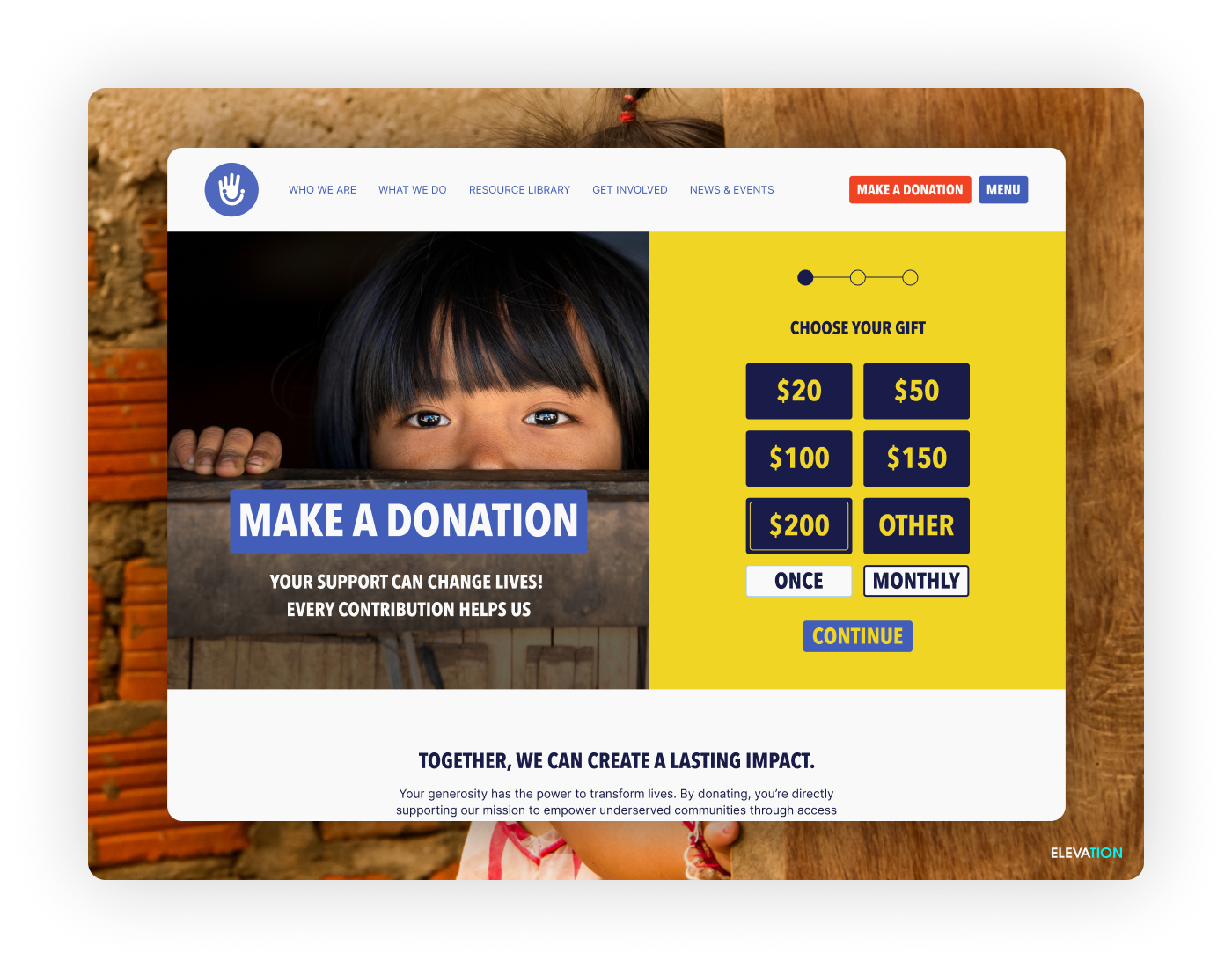Finding grants for nonprofit website development or other tech needs may seem like a daunting task–web design, digital marketing, etc can all seem like narrow needs. You might worry that you’ll never find a grant to cover them. This will be especially true if your organization is struggling to connect these tools to the meat of its mission.
Thankfully, there are many tech grants for nonprofits available. You’ll need to know how and where to look for them. You’ll also have to learn how to correctly frame tech projects in your grant applications. To help you get started, we’ve rounded up a list of more than 60 grants nonprofits can use for tech such as websites, plus gathered some tips for how to win technology grants.
What You Need to Know Before Doing Grant Research
Don’t jump in by typing keywords into a search engine. A successful grant research process means having a plan and knowing what to look for. Getting information organized first will help you to streamline the research process and focus only on the grants that are a good fit for your needs.
Gather information on these topics before beginning research:
- Date of incorporation and date of 501(c)3 recognition
- Whether your organization is a United Way/Fund Affiliate
- Your annual operating budget
- A list of nonprofits with similar programs or services
- A list of grants you applied to, received, or were denied in the past
- The type of grant funding you’re hoping to procure
To which you’ll add basic information about your nonprofit, like:
- A list of specific funding needs
- The general type of work your organization does
- Your nonprofit’s location
- Whether you serve a specific population
- The counties or regions your organization serves
Grant Types
Each grant restricts the type of activities it will fund. For technology grants, you’ll likely focus your research on general operating grants and technical assistance grants.
General Operating Support
Also known as unrestricted grants, these grants support your mission rather than specific programs or projects. The goal is to increase creativity and innovation, so your nonprofit has more freedom to decide how to wisely utilize the funds.
Management and Technical Assistance
These grants are not linked to your nonprofit’s mission. Instead, management and technical assistance grants enhance the organizational and administrative capacity of your nonprofit. They support your organization’s marketing, fundraising, technology, and management tasks.
Common Grant Sources
In addition to types of grants, your research will also take you to different grant sources. These will likely include government grants, foundation grants, and donor-advised funds.
Government
Government grants are available at the federal, state, and local levels. They are appropriated by agencies and departments. Examples of these departments at the federal level include the National Endowment for Humanities, the National Institute of Health, the Department of Education, and the Department of Health.
You can find federal grants at Grants.gov. State and local grants are administered at those respective regional levels.
Foundations
There are four different types of foundations: private, corporate, community and family.
- Corporate foundations: Funded by major corporations (i.e. Target, Walmart, Verizon Wireless, Nike) that established their own foundations. Annual contributions vary relative to the profit of the company. The more the company makes, the more they can give away to their foundation. Also, they usually give in communities where there is a corporate presence. A corporate presence could be a storefront, warehouse, manufacturing facility, or a corporate office. This is distinct from the funding provided by private business which is usually directly related to their services: think Google Ad Grant, Microsoft Edge Grant, etc.
Elevation used to offer select tech services with a 1 for 1 Matching Fund, which is currently closed and instead we offer a budget-conscious, pay-as-you-go Quickstart package.
- Private foundations: Like a nonprofit, private foundations have a mission and strategy. They’re required to give away money equal to 5% of their assets annually. This is because the government expects foundations to use their money to do good for society. Private foundations can only fund tax-exempt organizations. They must file a 990 PF, which stands for 990 profit foundation.
- Family foundations: Funded by contributions from individual benefactors or families. Small family foundations are often staffed by an attorney or gatekeeper. Family foundations often don’t solicit proposals.
- Community foundations: Funded by contributions from numerous individuals and families. They often limit grants to their community, and they’re frequently made up of a pool of Donor Advised Funds (DAFs).
Donor-Advised Funds
Donors get tax benefits to invest their assets in a fund. That fund is allowed to grow but remains earmarked for charitable contributions. The funds usually have a low operating expense, but unlike a private foundation, there is no requirement for when to distribute funds.
How to Find Technology Grants for Your Nonprofit
When conducting prospect research for grants, you need to narrow down your search to those grants that you have the best chance of receiving. The best way to narrow your focus is to figure out which funders best match your needs. To improve your chances of success, ask yourself the following questions before you start:
- Even though we’ve already confirmed our eligibility, does our program/project align with the funder’s current area of interest or desired profile?
- Where will my program/project have an impact? vs. Where we are located
- Does the average grant size fit my need?
- Will we be required to match the grant? If so, by what percentage?
- Are we confident we can “find our match”?
- Are funds paid upfront or is it a reimbursement grant?
- Look at the application timeline. Grant funds can take 6 to 9 months to acquire. Will the dollars come in time for our need?
- Are there restrictions (i.e. faith-based, no transport, etc.)?
Writing a Compelling Application
When it comes to operating cost versus program, funders often choose programs. This is because usually programs focus on the change you are trying to achieve and those narratives are more compelling. We share some tips for how to frame your project with a compelling narrative in our Checklist for a Compelling Tech Grant Application, below.
When it comes to your application, don’t focus on what the features can do or your clear need for them. Your best bet is to make your website a central tenet of your outreach, or of a specific program or project. As you work to reposition your proposal, make sure to set clear goals.
For example, avoid writing explanations like:
“Students in our after-school tutoring program need internet-connected devices because so many teachers assign online homework,”
Instead, you can rewrite the activity as a quantifiable goal:
“We want to double the capacity of our tutoring programs to help students with both online and offline homework.”
If you can’t quantify the goal, you can still define a successful outcome:
“We want to improve students’ reading fluency and track their progress towards a reading drive by providing them with internet-connected e-readers in our after-school tutoring program.”
Any proposal you submit must specify a clear outcome in terms of what success is and what it looks like. This makes it easier to write your grant applications and easier for funders to fund you because they recognize that your request has a clear beginning, middle, and end for their funding goals.
There are also great resources out there for conscientious language use as well as discussions of what makes for ethical storytelling. Grant writing isn’t about fawning on philanthropists; language choices can uphold harmful systems of oppression, or they can further anti-racist, community-centric principles.
Checklist for a COMPELLING Application
Start all drafts using this checklist in order to focus on what will be most compelling to decision-makers.
◊ Did you reach out to the contact/point-person to ask questions in advance? Have you personalized your application?
◊ Do you clearly demonstrate the key need(s) you are filling in the community?
◊ Do you illustrate your organization’s value with compelling stories?
◊ Do you highlight how an investment will be impactful?
◊ Have you demonstrated your ability to adapt to changing circumstances and still provide services to those you serve?
◊ Have you included additional context such as the impact of climate disasters/social unrest/economic downturn, etc. on your organization?
◊ Do you have clear goals for the funding? Do you specify what success looks like?
◊ Do you clearly demonstrate why you need support now?
Capital Fund vs. Operating or Program Cost
Another obstacle to winning grant applications for nonprofit tech is categorizing the costs appropriately. The Greater Washington Society of CPAs’ Nonprofit Financial Accountability Task Force provides guidance on how to correctly classify your nonprofit’s tech spending. Begin by identifying whether your expenses are from adding significant new functionality or from improving an existing website:
Improvements to an Existing Website
Any changes that update content or improve ease of use, but not functionality, are expensed as operating costs because they are similar to ongoing maintenance for a building.
New Website or Significant New Functionality
Adding significant new functionality, whether to an existing website or building a new one entirely, requires analyzing the costs involved at various stages of development. Some of these costs will be capitalized and amortized over time; others will be expensed as incurred.
Planning for a New Website
You should expense planning costs as they are incurred. Some examples of common costs are:
- Developing a plan that outlines the expected uses for the site
- Identifying the hardware and software needs for credit card processing or information databases
- Determining whether appropriate software exists
- Reviewing vendor proposals
- Addressing legal considerations for copyrights, trademarks, and privacy issues
Developing Applications and Infrastructure
Once you’re ready to actually begin creation, you should capitalize all costs. This includes all the work on the back end that is needed to provide the desired functionality. Costs incurred might include developing or acquiring software, databases, code for Web applications, and integrations with other applications. This is also when your nonprofit will purchase any hardware necessary to support the website. All purchases should follow the nonprofit’s existing capitalization policies.
Graphics
Capitalize costs that are associated with the visual impact of the website and its readability. This stage includes the layout of the site with backgrounds, fonts, frames, and buttons. Just as the costs to develop the back end functions are capitalized, these design costs should also be added to a balance sheet and amortized.
Website Operations
Once the new or enhanced website goes live, your nonprofit will continue to incur additional costs to operate it. Expense these costs, including training, content updates, and maintenance, as incurred. Then follow these guidelines to appropriately categorize additional costs related to operating the website:
- The cost of any additional enhancements should be treated as new software, which requires certain costs to be capitalized if they add functionality or are a product enhancement to externally marketed software.
- Internal costs for minor upgrades and enhancements may be expensed as maintenance costs if they cannot be reasonably separated.
- In addition to training and website maintenance costs, you should also expense costs of creating new links, registering with search engines, analyzing usage, website hosting, and performing routine backups.
Tech Grant Round-up
Now that you know what to look for and how to categorize your funding needs, start keeping a list of prospects. Not all grants will be specifically for website design. Some grants may be for marketing or operations. Spend more time on grants you’re more likely to win, rather than applying for as many grants as possible.
The tech grants below were identified using Instrumentl, a grant software that we’ve found to be a good paid option for finding grants. By signing up for a free trial, you can not only pull a list of grants that might fund your project, you can also build application checklists and get deadline reminders.
Can you recommend additional grants? Please help us build this list by emailing them to efriedrichs@elevationweb.org.
January Deadlines
| Name & Website | Admin Region | Program Region | Expense type | Eligibility Notes |
| Park | USA | USA | General Operating Expense |
• Cannot be the primary funder; No documentaries
• Preference for wide distribution and community engagement
• Fields of work: Animal Welfare; Environment, Media
|
| CPPS Heritage Mission | USA | Anywhere in the world | General Operating Expense; Capital Project | • Fields of work: Basic Human Needs; Christianity; Poverty Alleviation; Environmental Stewardship |
| Tinker | Anywhere in the world | Americas | General Operating Expense | • Fields of work: Democratic Governance, Education, Sustainable Resource Management |
| Deupree | USA | USA | General Operating Expense | • All kinds of organizations, but particularly education, social services, animal welfare and the environment |
February Deadlines
| Name & Website | Admin Region | Program Region | Expense type | Eligibility Notes |
| Sweetgrass | Anywhere in the world | Anywhere in the world | General Operating Expense |
• Not for academic approaches which treat living beings as objects of study
• Ecological health and cultural diversity and preservation, protection of pristine wilderness areas and supporting young people in gaining respect for the earth |
| Next World Now | Anywhere | Anywhere in the world | Capital Project |
• New ideas for old problems
• Fields of work: Community Development & Revitalization; Economic Services & Development;
Civic Engagement & Education; Education; Water Resource Management; Sanitation & Clean Drinking Water; Forestry; Health Care Access & Delivery; Social Justice / Human Rights; Peacebuilding; Supportive Housing & Shelters; Food Security; Sustainability; Civic Affairs; Community/Public Safety |
March Deadlines
| Name & Website | Admin Region | Program Region | Expense type | Eligibility Notes |
| Dr. Scholl | USA; World | USA; World | General Operating Expense |
• Grants are rarely made to endowments or capital campaigns
• Fields of work: Human & Social Services, Disability Care & Services, Homelessness Services, Youth Development & Leadership, Environment, Education, Community, Culture & Heritage, Health Care Access & Delivery, Civic Affairs |
April Deadlines
| Name & Website | Admin Region | Program Region | Expense type | Eligibility Notes |
| AARP Livable Communities | USA | USA | Capital Project |
• Ineligible: marketing of services
• Non-501(c)(3) organizations will be considered on a case-by-case basis • Fields of work: Economic Services & Development, Community Development & Revitalization, Real Estate & Housing, Public Transportation & Mass Transit Systems, Parks & Public Spaces, Civic Engagement & Education, Diversity & Inclusion |
| Olive Tree | USA | Anywhere in the world | Capital Project |
• Fields of work: Youth Development & Leadership, Art & Culture, Basic Human Needs, Academic Success & Enrichment, Civil Rights, Historic Preservation, Adult Education, Literacy, Workforce Preparation & Job Readiness, Parks & Public Spaces
|
May Deadlines
| Name & Website | Admin Region | Program Region | Expense type | Eligibility Notes |
| Lauren Townsend | USA | USA | General Operating Expense | • Not for administrative expenses
• Smaller nonprofits; Fields of work: Environmental Conservation, Animal Welfare – General |
June Deadlines
| Name & Website | Admin Region | Program Region | Expense type | Eligibility Notes |
| Gannett | USA | USA | General Operating Expense |
• Must have valid Employer Identification Numbers (“EINs”) and physical mailing address
• Fields of work: Mental Health & Psychiatric Diseases, Art & Culture, Community Development & Revitalization, Nutrition & Healthy Eating, STEM Education, Wellness & Healthy Living |
July Deadlines
| Name & Website | Admin Region | Program Region | Expense type | Eligibility Notes |
| Regina Bauer Frankenberg | USA | Anywhere in the world | Capital Project | • Ineligible: wildlife sanctuaries
• Threatened species organizations |
| Timmons | USA | USA; World | Outreach; Program |
• Will not fund operating expenses, salaries or buildings
• Has funded many types of non-profit organizations but generally prefers smaller, grass-roots groups with local appeal and the support of volunteers • Fields of work: Health & Medicine, Art & Culture, Human & Social Services, Education, Ecology, Minority Services
|
| John and Maria Laffin | USA | Anywhere in the world | General Operating Expense; Capital Project | • Fields of work: Health & Medicine; Human & Social Services |
August Deadlines
| Name & Website | Admin Region | Program Region | Expense type | Eligibility Notes |
| Arthur & Elaine Johnson | USA | USA | General Operating Expense |
• Fields of work: Research for and Direct Environmental Conservation; Wildlife Rehabilitation & Sanctuaries; Service Animals for Physical Handicaps
|
| National Endowment for the Arts | USA | USA | Capital Project |
• Cultural planning: Creative asset mapping, Creative business development, Systems Change, Ex: Business districts recently launched
|
| Good Green | USA | USA | General Operating Expense |
• Fields of work: Education; Employment; Expungement for non-violent cannabis offenders to fight back against the War on Drugs and its devastating impact on Black and Brown communities
|
September Deadlines
| Name & Website | Admin Region | Program Region | Expense type | Eligibility Notes |
| Hansen | USA | Anywhere in the world | General Operating Expense | • Fields of work: Humanitarian Support; Disadvantaged Children; Education; Arts and Culture; Environmental Causes; Animal Welfare. |
| Horne Family | USA | USA; Africa | General Operating Expense | • Fields of work: Environmental Conservation; Climate Change Resilience; Animal Welfare |
| Resilia | USA | USA | Projects | • Ineligible: endowments or capital requests
•They are a nonprofit technology platform offering $1k microgrants |
October Deadlines
| Name & Website | Admin Region | Program Region | Expense type | Eligibility Notes |
| State Farm | USA | USA | General Operating Expense |
• Fields of work: Community Development & Revitalization, Disaster Preparedness, Disaster Relief / Humanitarian Aid, Firefighting & Fire Prevention, Workforce Preparation & Job Readiness, Financial Literacy, Career/College Preparation, Teacher Development & Training, Automotive Safety, Affordable Housing, Business Development, Homeownership, College Success / Persistence, Education System Policy & Reform, Volunteerism & Philanthropy, Academic Success & Enrichment
|
November Deadlines
| Name & Website | Admin Region | Program Region | Expense type | Eligibility Notes |
| Bullit | Canada; USA | Canada; US counties abutting Canada | General Operating Expense |
• Fields of work: Environmental Conservation, Environment, Sustainability, Urban Planning, Renewable/Sustainable Energy, Green Infrastructure
|
| Max and Victoria Dreyfus | USA | USA | General Operating Expense |
• For whom a relatively small amount of funding might make a large difference
• Fields of work: Disability Care & Services, Environmental Conservation, Community Services, Youth Services, Museums & Cultural Institutions, Performing Arts, Community Culture & Heritage, Workforce Preparation & Job Readiness, Senior Services, Wildlife Management, Education – K through 12, Vocational & Trade Education, Life Skills Training & Rehabilitation, Education – Higher Education, Education – Preschool / Early Learning, Health Facilities & Clinics |
December Deadlines
| Name & Website | Admin Region | Program Region | Expense type | Eligibility Notes |
| Home Depot | USA | USA | Capital Project |
• Fields of work: Disability Care & Services, Community Development & Revitalization, Affordable Housing, Real Estate & Housing, Supportive Housing & Shelters, Military & Veterans Services, Energy Efficiency & Conservation, Senior Services, Education – K through 12
|
| Cowles | USA | Anywhere in the world | General Operating Expense |
• Welcomes applications seeking GOS funding and recognizes the difficulty of funding general operating costs.
• Favors applicants who have a wide base of support for their programing; prefers not to be the only funder. • Fields of work: Art & Culture; Health & Medicine; Social Justice / Human Rights; Education |
| Walmart | USA | USA | General Operating Expenses | • Must benefit communities near a Walmart facility to which you plan to apply
• Fields of work: any sector |
| Harris and Francis Block | USA | USA | Outreach; Program |
• Fields of work: Food Access & Hunger Environmental Justice & Advocacy Immigrant Services Immigration & Refugee Rights Refugee Services Reproductive Rights Health Care Access & Delivery Economic Rights & Justice Agricultural Education Nutrition & Healthy Eating Forestry Outdoor Recreation Environmental Education Climate Change Resilience ; supports small grassroots not-for-profit organizations. will not consider requests for endowments, capital construction, or deficit financing
|
| JW Couch | USA | USA | General Operating Expense |
• Yes to for-profit organizations aligned with one of three charitable programs: preservation, education, or wellness; or to registered 501(c)3 non-profit organizations
• Provide general operating support, fund specific programs or help social entrepreneurs get new products off the ground. |
| National Endowment for Democracy | Anywhere in the world | Anywhere in the world | Outreach; Program | • Direct grants to advance democratic goals and strengthen democratic institutions |
Rolling Deadlines
Nonprofits can apply to rolling grants at any time in the year as these have no due date. We’ve compiled a list of these that we share in our newsletter. Sign up now to receive a list of 33 more grants with open deadlines.
More Online Resources for Grant Research
In addition to the above list, here are additional websites you can use to search for more web design grants:
- Grants.gov
- The Grantsmanship Center
- Candid 990 Finder
- Foundation Directory Online
- FundsNet
- Philanthropy News Digest
- Grantmakers.io
- Grant Gopher
- Grant Watch
- Grant Station
- Instrumentl
Will You Hire a Grant Writer?
Now that you’ve narrowed down a list of grants to apply to, you might consider hiring a grant consultant to do the actual grant writing. Grant writing consultants can:
- Research opportunities
- Write and submit grants
- Help with follow-up and grant reporting
- Implement a plan for program and organizational development
When hiring a grant consultant, you should first look for clear and compelling writing. It takes skill to write a convincing grant proposal, so not just anyone can do it. Be sure to ask for samples of proposals they’ve done in the past, but also check that writing isn’t a grant consultant’s only skill. Grant writers need to be good project managers to ensure a smooth grant writing process from start to finish.
As you review candidates, prioritize experience over credentials. If a consultant has a PhD or other impressive credentials, but has little experience in the field, keep looking. Experience will ensure that your consultant fully understands the grant seeking process and has a penchant for how funders think and make decisions.
Final Thoughts
As you apply for grants, begin mapping out the specifics of your nonprofit’s needs and requesting quotes from vendors. For help, check out our complete RFP guide or our free editable RFP template. Feel free to reach out with any technology questions you have when writing your grant application.
Let us know how it goes and we hope you’ll contact us when you’re ready to start your web or marketing project!
P.S. Can you recommend additional grants? Please help us build this list by emailing them to efriedrichs@elevationweb.org.





